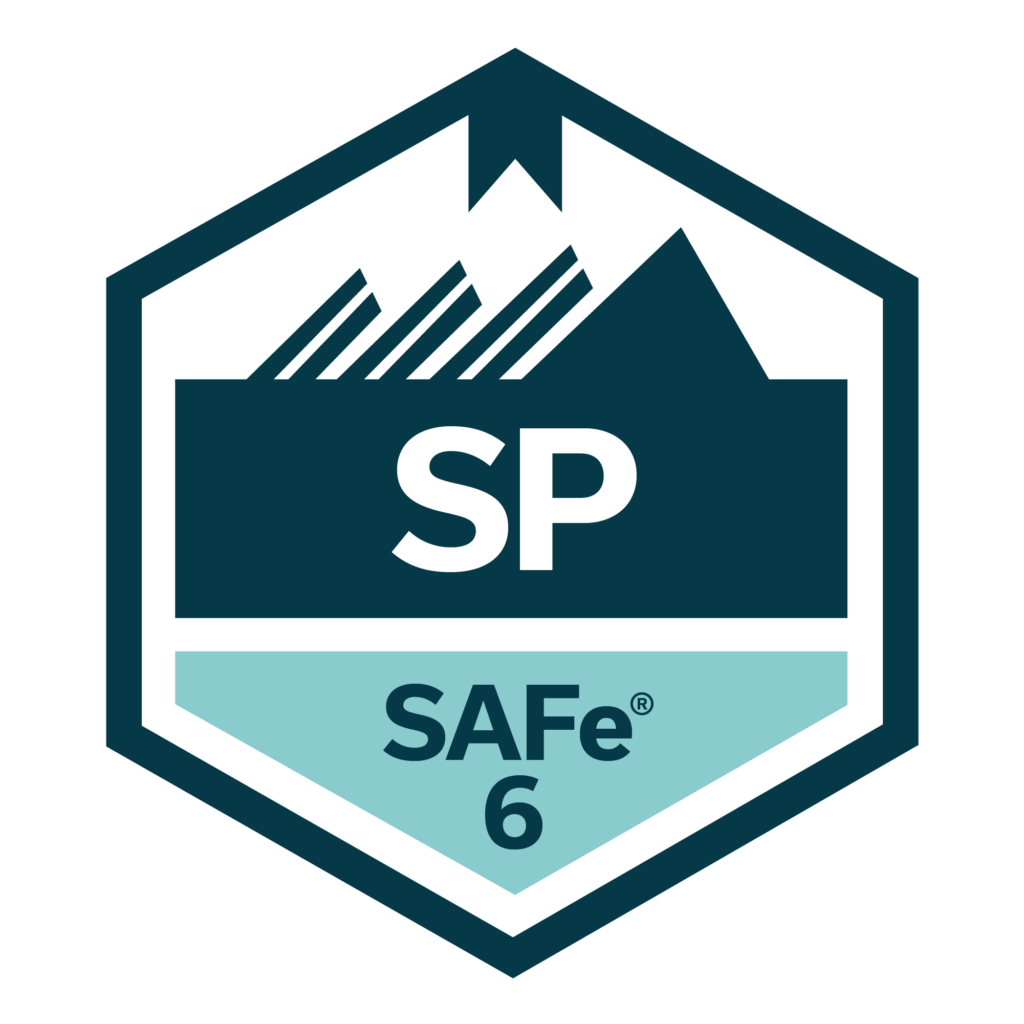Scaled Agile: SAFe Practitioner (SP)

Overview of the SP Certification
The SAFe Practitioner (SP) certification from Scaled Agile is designed for Agile team members who are part of a SAFe Agile Release Train (ART). This certification confirms a professional’s ability to work effectively in a scaled Agile environment, applying SAFe principles to support team and program-level goals.
Importance of the Certification in the Agile Community
The SP certification holds high value in the Agile community, particularly in organizations implementing the Scaled Agile Framework (SAFe). It signifies that a professional has the foundational knowledge and skills to contribute to high-performing Agile teams within larger, scaled Agile initiatives.

Key Facts :
- Date Launched: 2016
- Founder: Scaled Agile, Inc.
- Number of Certified Professionals: Over 100,000 worldwide
- Global Recognition: The SAFe Practitioner (SP) certification is valued by employers globally, especially in organizations scaling Agile practices with SAFe. It is a key credential for team members looking to contribute effectively within a SAFe environment.
Target Audience :
The SP certification is aimed at professionals working within Agile teams that are part of a SAFe Agile Release Train. It is particularly beneficial for:
- Agile Team Members: Those working in roles such as developers, testers, and product owners who are part of a SAFe environment.
- Scrum Masters: Scrum Masters working in SAFe organizations who want to better understand the scaled environment.
- Project and Program Managers: Managers who oversee teams within SAFe Agile Release Trains.
- Anyone Working in SAFe Environments: Individuals involved in SAFe implementations who want to strengthen their foundational knowledge of scaled Agile practices.
Certification Objectives
The SAFe Practitioner (SP) certification validates key competencies and knowledge areas necessary for success in a scaled Agile environment, including:
- Understanding SAFe Principles: Knowledge of the core SAFe values and principles that guide Agile practices at scale.
- Effective Team Collaboration: Skills to work effectively within cross-functional teams, contributing to Agile Release Train objectives.
- PI (Program Increment) Planning: Understanding of Program Increment (PI) planning and how it aligns Agile teams to common objectives.
- Commitment to Continuous Improvement: Emphasis on relentless improvement within the team and program to maximize value delivery.

Skills and Knowledge Gained

The SAFe Practitioner (SP) certification provides professionals with essential skills and knowledge to contribute effectively in a SAFe Agile Release Train. Key areas of knowledge include:
- SAFe Fundamentals: Deep understanding of SAFe principles and Lean-Agile values.
- Agile Teamwork: Skills for collaborating and contributing effectively within cross-functional teams.
- PI Planning Facilitation: Understanding of PI planning processes, helping teams align on shared objectives.
- Commitment to Improvement: Ability to support continuous improvement through Agile practices.
Detailed Breakdown of the Certification Process
Steps to Certification :
Pre-requisites: There are no formal prerequisites for the SAFe Practitioner (SP) certification, but Scaled Agile recommends a foundational understanding of Agile and Lean principles. Familiarity with the SAFe framework is beneficial.
Training Requirements: Formal training is required. Candidates must complete the “SAFe for Teams” course, led by a certified SAFe Program Consultant (SPC), which provides hands-on experience in SAFe practices and prepares candidates for the SP certification.
Exam Format :
- Number of Questions: 45
- Question Type: Multiple-choice and true/false
- Time Limit: 90 minutes
- Passing Score: 77%
- Retake Policy: Candidates who fail can retake the exam after purchasing another attempt.
Certification Levels :
The SAFe Practitioner (SP) certification is an entry-level certification within the Scaled Agile Framework, specifically tailored for team members within an Agile Release Train.
Recertification :
The SP certification requires renewal annually to ensure that certified professionals stay current with evolving SAFe practices.

Key Benefits of the Certification for Organizations

Impact on Teams and Organizations :
Organizations with SAFe Practitioner-certified professionals benefit from improved team collaboration, alignment on goals, and more efficient project delivery. SP-certified team members understand how to support SAFe implementations, helping teams work together to meet program objectives.
Real-World Application :
At companies like Cisco and Ford, SP-certified professionals have been instrumental in streamlining Agile team practices, improving collaboration, and aligning teams around common goals, resulting in faster time-to-market and increased overall productivity.
Industry Recognition :
The SAFe Practitioner (SP) certification is recognized by leading companies such as Deloitte, Amazon, Accenture, and Intel, which prioritize hiring professionals with knowledge of SAFe practices. This global recognition makes SP a valuable credential in scaled Agile environments.
Case Studies :
At Nokia, the implementation of SAFe practices, led by SP-certified team members, resulted in a 20% improvement in team velocity and enhanced alignment across Agile Release Trains. Another example is HP, where SP-certified professionals helped optimize Agile Release Train performance, leading to faster delivery and improved collaboration.
Certification Costs and Value Proposition
Cost of Certification :
The SAFe Practitioner (SP) certification exam costs $100 USD. Completing the required “SAFe for Teams” course typically ranges from $600 to $1,200, depending on the provider and location.
Return on Investment (ROI) :
The ROI for the SP certification is substantial. Professionals with SP certification report improved team performance and effectiveness, with many seeing career advancements within SAFe environments. SP-certified team members are also in higher demand in organizations scaling Agile practices.
Financial Aid and Discounts :
Scaled Agile, Inc. does not offer direct financial aid, but many training providers offer group discounts for companies certifying multiple employees. Organizations that sponsor training for teams may benefit from reduced rates when certifying groups.

Comparison with Other Certifications

Competitor Analysis :
The SP certification is often compared to certifications like the Certified Scrum Developer (CSD) from Scrum Alliance and the Professional Scrum Developer (PSD) from Scrum.org. While CSD and PSD focus on Agile development practices, SP is specifically designed for scaled environments and emphasizes the SAFe framework, making it particularly valuable for team members in organizations implementing SAFe.
Unique Features :
The SP certification stands out for its focus on SAFe principles and practices, specifically within Agile Release Trains. It also emphasizes the role of team members in aligning with program-level goals, making it ideal for those working in scaled Agile environments. Unlike other Agile team certifications, SP provides a unique focus on PI planning and large-scale collaboration.
Industry Trends :
As organizations increasingly adopt Agile at scale, certifications like SP are becoming essential. The SP certification provides the foundational knowledge necessary for team members to contribute effectively within SAFe, making it a relevant choice for professionals working in globally distributed and digital-first environments.
The Future of Agile and This Certification
Emerging Trends :
As Agile practices continue to evolve, certifications like SP are adapting to address the challenges of Agile at scale, remote team collaboration, and digital transformation. The SP certification remains relevant, equipping team members with essential skills for modern scaled Agile environments.
Future Updates to the Certification :
Scaled Agile, Inc. regularly reviews and updates the SP certification exam to reflect the latest industry practices. Future updates may place greater emphasis on remote Agile team collaboration and advanced metrics for improving team performance in scaled environments.
Relevance in a Changing Market :
As businesses navigate increasingly complex project environments and fast-changing market conditions, the demand for professionals certified in scaled Agile practices will continue to grow. The SP certification equips team members with the skills needed to support high-performing Agile Release Trains, making them valuable assets in industries undergoing Agile transformations.

Conclusion
The SAFe Practitioner (SP) certification is an essential credential for professionals working within Agile Release Trains in a SAFe environment. By validating skills in SAFe practices, PI planning, and collaboration within Agile teams, SP-certified professionals are well-equipped to contribute meaningfully to scaled Agile implementations. As organizations continue to embrace Agile at scale, SP-certified team members play a critical role in achieving alignment and efficiency across teams, making the SP certification a valuable asset for anyone working in SAFe.